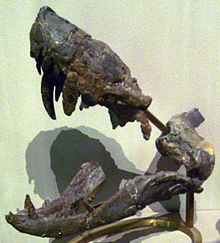Lycosuchidae
| Lycosuchidae Temporal range: Middle Permian,
| |
|---|---|

| |
| Skull of Lycosuchus sp. in the Museum für Naturkunde | |
| Scientific classification | |
| Domain: | Eukaryota |
| Kingdom: | Animalia |
| Phylum: | Chordata |
| Clade: | Synapsida |
| Clade: | Therapsida |
| Clade: | †Therocephalia |
| Family: | †Lycosuchidae Nopcsa, 1923 |
| Genera | |

Lycosuchidae is an extinct family of therocephalian therapsids from the Middle Permian Beaufort Group of South Africa. It currently contains two monotypic genera, Lycosuchus, represented by L. vanderrieti, which was named by paleontologist Robert Broom in 1903, and Simorhinella, represented by S. baini, which was named by Broom in 1915. Both species are characterized by their large body sizes and short, deep snouts. Two sets of enlarged canine teeth were once regarded as a defining feature of lycosuchids, but recent studies have proposed that the front-most pair are replacements for the ones behind them, which would have eventually fallen out as individuals aged. Lycosuchids are the earliest known therocephalians and are also thought to be the most basal.[2]
References
- ^ Kammerer, C. E. (2023). "Revision of the Scylacosauridae (Therapsida: Therocephalia)". Palaeontologia africana. 56: 51–87. ISSN 2410-4418.
- ^ Abdala, F.; Kammerer, C. F.; Day, M. O.; Jirah, S.; Rubidge, B. S. (2014). "Adult morphology of the therocephalian Simorhinella bainifrom the middle Permian of South Africa and the taxonomy, paleobiogeography, and temporal distribution of the Lycosuchidae". Journal of Paleontology. 88 (6): 1139. doi:10.1666/13-186.



